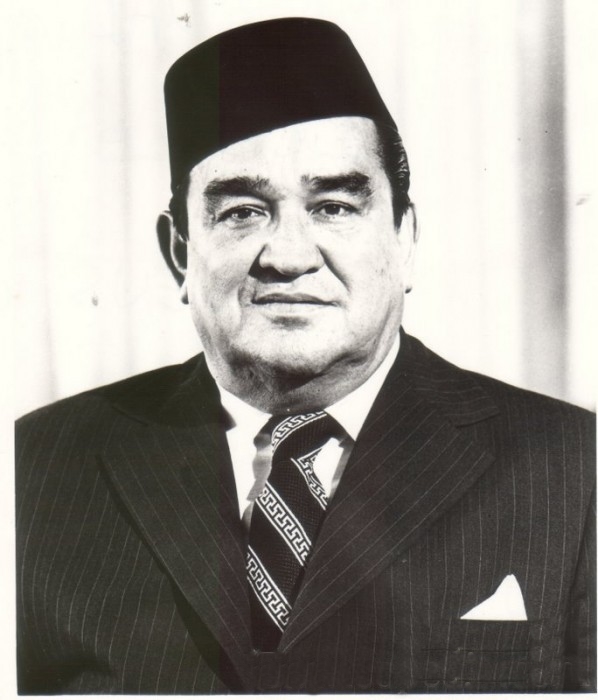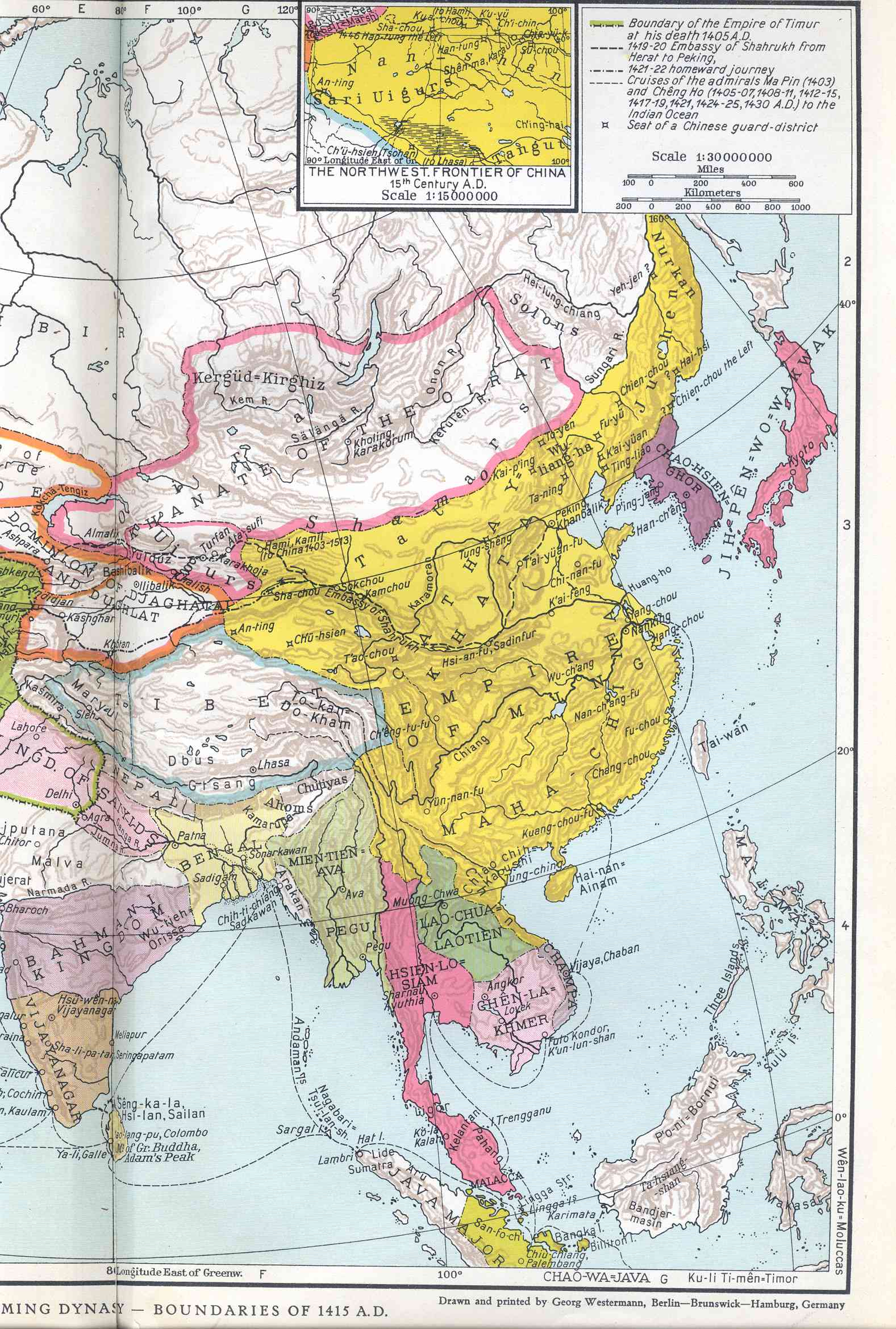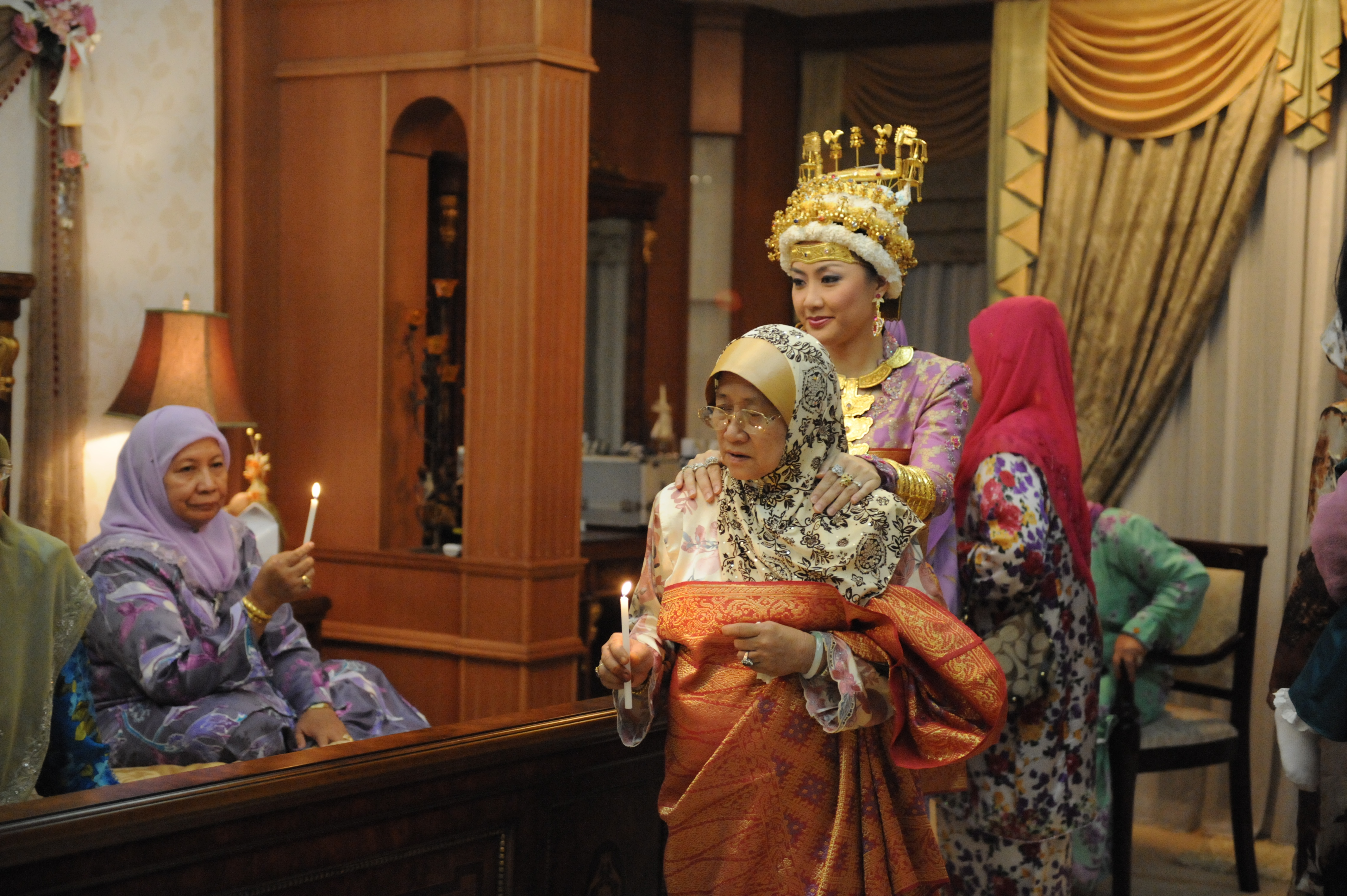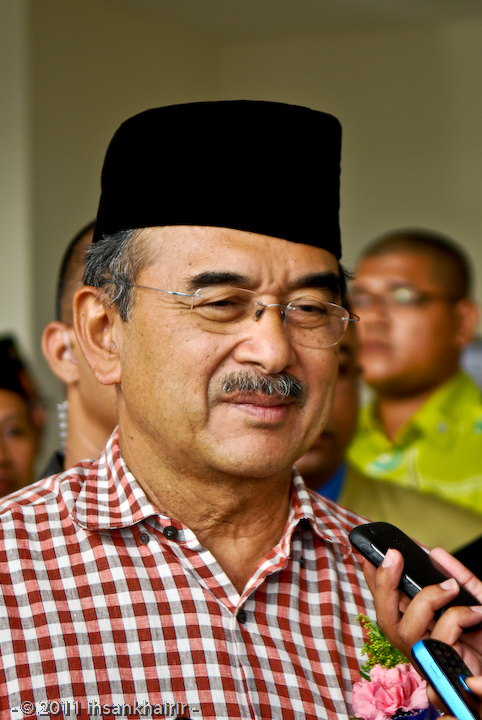|
Chief Minister Of Sabah
The chief minister of Sabah is the head of government of Sabah, Malaysia. Since September 2020, the position has been held by Hajiji Noor from the Parti Gagasan Rakyat Sabah (Gagasan Rakyat) from the coalition of Gabungan Rakyat Sabah (GRS) which had won the 2020 Sabah state election. As in other parts of the Malaysian federation, the Westminster Parliamentary system is adopted, whereby, the leader of the party with the most seats in the state legislature would usually become the chief minister of Sabah. In other words, it is the person commanding the support of the state legislature. The chief minister is appointed by the head of state known as the Yang di-Pertua Negeri. In comparison to other states in Malaysia, the office of the chief minister of Sabah has been held by a more diverse group of people in terms of ethnicity and religion. The post has been held by Kadazan-Dusuns, Bajaus, Malays, Chinese, Muruts, Rungus, Sungai, Idaans, and other persons of mixed heritage ... [...More Info...] [...Related Items...] OR: [Wikipedia] [Google] [Baidu] |
Hajiji Noor
Hajiji bin Noor (; born 10 May 1955) is a Malaysian politician who has served as the 16th Chief Minister of Sabah since 2020 and Member of the Sabah State Legislative Assembly (MLA) for Sulaman since 1990. He is also the first official chairman of political coalition party in Sabah, the Gabungan Rakyat Sabah Party (GRS Party) and 3rd President of the Parti Gagasan Rakyat Sabah (GAGASAN). He was appointed Chief Minister in late September 2020 after his coalition, Gabungan Rakyat Sabah (GRS), won 38 out of the 73 seats, in which 37 seats needed for a simple majority in the 2020 state election. His administration was further strengthened after three independent members of state legislative assembly (MLAs) pledged their support for the state government. Early background Hajiji was born in Kampung Serusup, Tuaran as the second of three children of Noor Harun and Teruyah Omar (both now deceased). He firstly attended the Serusup Native Primary School (SK Serusup) for his p ... [...More Info...] [...Related Items...] OR: [Wikipedia] [Google] [Baidu] |
2020 Sabah State Election
The 2020 Sabah state election took place on 26 September 2020 to elect all 73 elected members of the 16th Sabah State Legislative Assembly. The previous Assembly was dissolved on 30 July 2020. The state snap election was called prematurely after a political crisis arose. Both Shafie Apdal, incumbent Chief Minister and leader of Sabah Heritage Party (WARISAN) and Pakatan Harapan (PH) coalition government and Musa Aman, leader of Perikatan Nasional (PN) and Barisan Nasional (BN) coalition opposition claimed to have the majority to form the government. However, the Governor of Sabah, Juhar Mahiruddin decided to dissolve the State Legislative Assembly on the advice of Shafie. The state election was conducted under the New Normal and special standard operating procedures (SOP) imposed by the Electoral Commission (EC) as the country is still observing the Recovery Movement Control Order (RMCO) due to COVID-19 pandemic. Gabungan Rakyat Sabah (GRS) coalition won the election with ... [...More Info...] [...Related Items...] OR: [Wikipedia] [Google] [Baidu] |
Rungus People
The Momogun Rungus are an Austronesian peoples, Austronesian ethnic group indigenous to Sabah, Malaysia. They primarily live in northern Sabah especially in Kudat, Kota Marudu and Pitas, Malaysia, Pitas districts with small minorities in the Beluran district of the east coast Sandakan Division. They have a distinct language, dress, architecture, customs and oral literature from other Dusunic sub-groups. There are around 74,000 Rungus people in the state. Subsistence As with most indigenous ethnic groups in Borneo, culture revolves around rice; however, coconut and banana groves provide cash income. Women weave cloth on backstrap looms, and make containers from vine or beadwork. Many Rungus now work in town, and have abandoned the communal life of the longhouse for modern Malaysian society. Momogun Rungus has a very antique traditional writing which is one of the forms of writing Hieroglyph, hieroglyphs or called ''Surip'' in the Rungus language. Traditionally, this tribe pr ... [...More Info...] [...Related Items...] OR: [Wikipedia] [Google] [Baidu] |
Murut People
The Murut, alternatively referred to as Tagol/Tahol, constitute an indigenous ethnic community comprising 29 distinct sub-ethnic groups dwelling within the northern inland territories of Borneo. Characterized by their rich cultural diversity, the Murutic languages form a linguistic family encompassing approximately half a dozen closely intertwined Austronesian languages. Murut populations exhibit dispersion in Malaysia's Sabah and the northern part of Sarawak, as well as in the country of Brunei and the Indonesian North Kalimantan Province. Furthermore, the Murut people have close connections with the Tidung people, Tidung, who historically inhabited Borneo's east coast region that underwent processes of Islamization and Malayalization, Etymology The literal translation of ''murut'' is "hill people". Demographics A large percentage of the Murut communities are in the southwest interior of Sabah, East Malaysia, specifically the districts of Keningau, Tenom, Nabawan, Labua ... [...More Info...] [...Related Items...] OR: [Wikipedia] [Google] [Baidu] |
Malaysian Chinese
Malaysian Chinese, Chinese Malaysians, or Sino-Malaysians are Malaysians, Malaysian citizens of Chinese people, Chinese ethnicity. They form the second-largest ethnic group in Malaysia, after the Malaysian Malays, Malay majority, and , constituted 23.2% of the country's citizens. In addition, Malaysian Chinese make up the second-largest community of overseas Chinese globally, after Thai Chinese. Within Malaysia, the ethnic Chinese community maintains a significant and substantial presence in the Economy of Malaysia, country's economy. Most Malaysian Chinese are descendants of Southern China, Southern Chinese immigrants who arrived in Malaysia between the early 19th and the mid-20th centuries before the country attained independence from British colonial rule. The majority originate from the provinces of Fujian and Lingnan (including the three modern provinces of Guangdong, Hainan and Guangxi). They belong to diverse linguistic subgroups speaking Chinese such as the Hoklo peop ... [...More Info...] [...Related Items...] OR: [Wikipedia] [Google] [Baidu] |
Bruneian Malay People
Bruneian MalaysBrunei Malay in its various forms can be identified with a nation, an ethnic group and a region. (, Jawi alphabet, Jawi: ) are a native Malays (ethnic group), Malay ethnic group that lives in Brunei, the Federal Territories of Malaysia, federal territory of Labuan, the southwestern coast of Sabah and the northern parts of Sarawak. The Bruneian Malays are a subgroup of the larger ethnic Malays (ethnic group), Malay population found in the other parts of the Malay World, namely Peninsular Malaysia and the central and southern areas of Sarawak including neighbouring lands such as Singapore, Indonesia and Southern Thailand, having visible differences especially in language and culture, even though they are ethnically related to each other and follow the teachings of Islam. All Bruneian Malays who are born or domiciled in East Malaysia even for generations before or after the independence of the states of Sabah and Sarawak from the British Empire through the formation ... [...More Info...] [...Related Items...] OR: [Wikipedia] [Google] [Baidu] |
Bajau People
The Sama-Bajau include several Austronesian ethnic groups of Maritime Southeast Asia. The name collectively refers to related people who usually call themselves the Sama or Samah (formally A'a Sama, "Sama people"); or are known by the exonym Bajau (, also spelled Badjao, Bajaw, Badjau, Badjaw, Bajo or Bayao). They usually live a seaborne lifestyle and use small wooden sailing vessels such as the '' perahu'' (''layag'' in Maranao), ''djenging'' (''balutu''), '' lepa'', and ''vinta'' (''pilang''). They also use medium-sized vessels like the '' jungkung'', ''timbawan'' and small fishing vessels like ''biduk'' and '' bogo-katik''. Some Sama-Bajau groups native to Sabah are also known for their traditional horse culture. The Sama-Bajau are the dominant ethnic group of the islands of Tawi-Tawi. They are also found in other islands of the Sulu Archipelago, coastal areas of Mindanao and other islands in the southern Philippines; as well as northern and eastern Borneo, Sulawesi, and ... [...More Info...] [...Related Items...] OR: [Wikipedia] [Google] [Baidu] |
Kadazan-Dusun
Kadazandusun (also written as Kadazan-Dusun or Mamasok) are the largest ethnic group in Sabah, Malaysia, an amalgamation of the closely related indigenous peoples, indigenous Kadazan people, Kadazan and Dusun people, Dusun peoples. "Kadazandusun" is an umbrella term that encompasses both the Kadazan and Dusun peoples. They are also known as Mamasok Sabah, meaning "indigenous people of Sabah". Kadazandusun tradition holds that they are the descendants of Nunuk Ragang. Kadazandusun is recognised as an indigenous nation of Borneo with documented heritage by the UNESCO, United Nations Educational, Scientific and Cultural Organization (UNESCO) since 2004. Kadazandusuns are part of the Bumiputera (Malaysia), bumiputera in Malaysia having been endowed with rights concerning land, rivers, education and maintaining their own customary laws. Etymology The "Kadazan" term is used among the Tangara/Tangaa' tribe on the west coast of Sabah to refer to themselves. Non-Tangara tribes with ... [...More Info...] [...Related Items...] OR: [Wikipedia] [Google] [Baidu] |
Yang Di-Pertua Negeri
In Malaysia, the Governor, officially Yang di-Pertua Negeri (Jawi script, Jawi: , ) is a constitutional title given to the head of state in States and federal territories of Malaysia, states without a ruler, namely: Penang, Malacca, Sabah and Sarawak. This is in contrast to a ruler () which is a constitutional title given to states with hereditary monarchies, namely: the Sultans of Johor, Kedah, Kelantan, Pahang, Perak, Selangor and Terengganu; the House of Jamalullail (Perlis), Raja of Perlis and the ''Yang di-Pertuan Besar'' (lit. 'He Who is Made Chief Ruler') of Negeri Sembilan. They are appointed to renewable four-year terms by the ''Yang di-Pertuan Agong'' (lit. 'He Who is Made Supreme Ruler'), the King of Malaysia, after consulting the Heads of state governments of Malaysia, chief minister or premier. functions as the head of state in a parliamentary democracy. Their discretionary roles include appointing the head of government, the chief minister (Malay: ''Ketua Men ... [...More Info...] [...Related Items...] OR: [Wikipedia] [Google] [Baidu] |
Head Of State
A head of state is the public persona of a sovereign state.#Foakes, Foakes, pp. 110–11 "[The head of state] being an embodiment of the State itself or representative of its international persona." The name given to the office of head of state depends on the country's form of government and any separation of powers; the powers of the office in each country range from being also the head of government to being little more than a ceremonial figurehead. In a parliamentary system, such as Politics of India, India or the Politics of the United Kingdom, United Kingdom, the head of state usually has mostly ceremonial powers, with a separate head of government. However, in some parliamentary systems, like Politics of South Africa, South Africa, there is an executive president that is both head of state and head of government. Likewise, in some parliamentary systems the head of state is not the head of government, but still has significant powers, for example Politics of Morocco, Moro ... [...More Info...] [...Related Items...] OR: [Wikipedia] [Google] [Baidu] |
Dewan Undangan Negeri Sabah
The Sabah State Legislative Assembly ( Kadazandusun: ''Langga' Tinukuan Pogun Sabah'', ) is a part of the legislature of Sabah, Malaysia, the other being the governor of Sabah. The assembly meets at the Sabah State Legislative Assembly Building at Likas in the state capital of Kota Kinabalu. This unicameral legislature currently has 73 seats representing state constituencies elected through a first-past-the-post electoral system across the state. Like at the federal level in Malaysia, Sabah uses a Westminster-style parliamentary government, in which members are elected to the legislative assembly through general elections, from which the chief minister and the cabinet are appointed based on majority support. The chief minister is head of government, while the governor acts as head of state. The largest party not forming the government is known as the official opposition, its leader being recognised as leader of the opposition by the speaker. Members of the assembly refer t ... [...More Info...] [...Related Items...] OR: [Wikipedia] [Google] [Baidu] |
Political Party
A political party is an organization that coordinates candidates to compete in a particular area's elections. It is common for the members of a party to hold similar ideas about politics, and parties may promote specific political ideology, ideological or policy goals. Political parties have become a major part of the politics of almost every country, as modern party organizations developed and spread around the world over the last few centuries. Although List of countries without political parties, some countries have no political parties, this is extremely rare. Most countries have Multi-party system, several parties while others One-party state, only have one. Parties are important in the politics of autocracies as well as democracies, though usually Democracy, democracies have more political parties than autocracies. Autocracies often have a single party that Government, governs the country, and some political scientists consider competition between two or more parties to ... [...More Info...] [...Related Items...] OR: [Wikipedia] [Google] [Baidu] |










